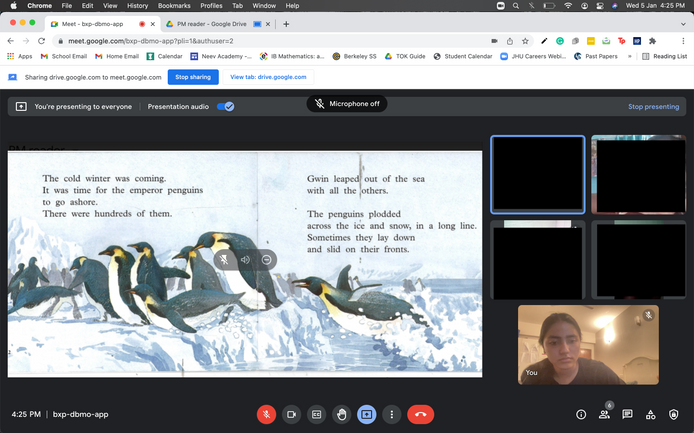
Perrineal Reading Program
The National Education Policy 2020 marked a significant step toward addressing long-standing challenges in India’s education system. One key initiative was the emphasis on institutionalizing reading programs—an area often taken for granted by those of us privileged with the time and resources to develop these skills early.
Our Method
Since 2021, our reading program has worked with over 180 underprivileged students from two schools in Bangalore and Dharamshala. We focus on students in grades 4 and 5—a crucial stage when children shift from “learning to read” to “reading to learn.” Without a strong reading foundation at this point, students often struggle to keep pace with the rest of their education.
Each student participates in the program for six months, starting with the Developmental Reading Assessment (DRA), which places them in a reading category. Based on this, students are grouped and introduced to a wide variety of texts suited to their level. They then participate in 30-minute sessions three times a week, engaging in read-alouds, discussion-based comprehension work, and activities like character studies. These sessions aim to build vocabulary, strengthen reading habits, and help students engage more deeply with narrative structure and point of view.
Assessments are conducted monthly in the beginning, and then every six weeks after the initial three months. Students "graduate" from the program once they reach the international reading standard appropriate for their age, which usually means progressing 5–6 letter levels according to the DRA.
Our Locations
Parikrma Schools, Bangalore

We have been working with two branches of Parikrma schools in Bangalore since 2021, where the program first began with a small group of 15 students. Since then, we’ve worked with approximately 30 students each year, selected by teachers based on who they feel would benefit most from focused attention and assisted reading time.
The program is conducted entirely online, with occasional in-person visits by volunteers. Each year, the participating students also attend the Neev Literature Festival, where they meet their volunteers in person and enjoy the festival alongside their teachers—a highlight that reinforces their relationship with reading in a joyful and immersive setting.
Tibetan Children's Village, Dharamshala

We began working with students from the Tibetan Children's Village in 2024 and have completed one cycle of the program so far, conducted entirely online in collaboration with student volunteers from Neev Schools in Bangalore.
Thanks to the residential nature of the school and the strong support from their dedicated teachers, students demonstrated remarkable progress and advanced through reading levels at an accelerated pace. Based on this experience, we are currently reworking our expectations and planning adjustments to the program, which will resume in July 2025, to better align with the students’ learning pace and potential.








